BUS707 - Research Proposal: AI in Auditing and Accounting Impact
VerifiedAdded on 2022/10/17
|20
|4941
|127
Report
AI Summary
This research proposal explores the transformative impact of Artificial Intelligence (AI) on auditing and accounting practices. The study delves into various aspects, including the evolution of AI in the business landscape, its potential applications in auditing, and the associated benefits and challenges. The research addresses key questions such as how AI will reshape the audit process, the analysis of investment costs and benefits related to AI implementation, and the role of robotic automation in reshaping accounting and auditing professions. The proposal outlines a comprehensive research design, including data collection and analysis methods, ethical considerations, and research limitations. The literature review examines the managerial implications of AI adoption, the conceptualization of AI in auditing (sensors, meta-processes, and data analysis), and the impact of automation tools. The study aims to provide insights into how AI can enhance audit quality, optimize processes, and enable better decision-making in the finance sector. The study also considers the ethical implications of AI implementation and proposes recommendations for future research in this evolving field.
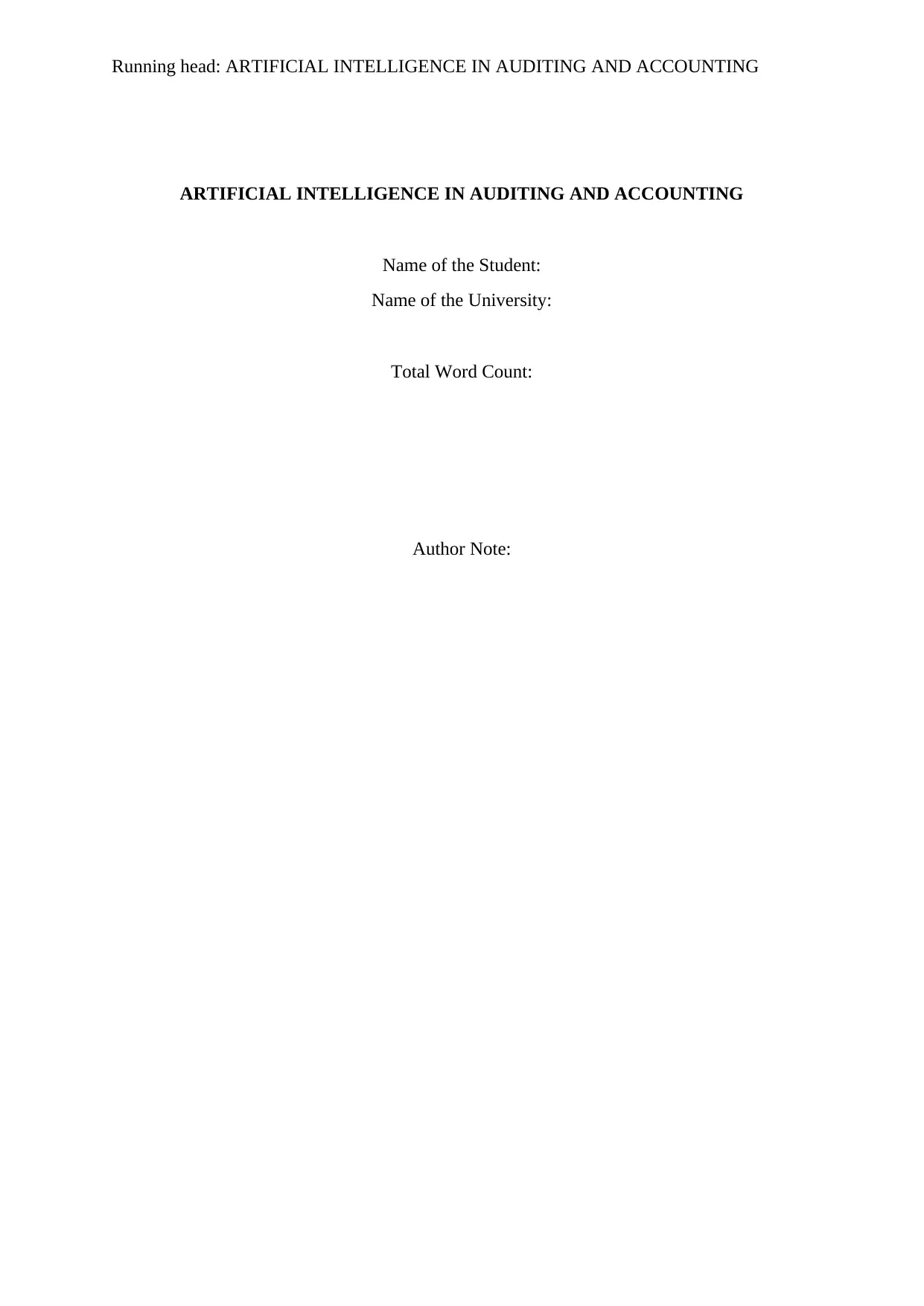
Running head: ARTIFICIAL INTELLIGENCE IN AUDITING AND ACCOUNTING
ARTIFICIAL INTELLIGENCE IN AUDITING AND ACCOUNTING
Name of the Student:
Name of the University:
Total Word Count:
Author Note:
ARTIFICIAL INTELLIGENCE IN AUDITING AND ACCOUNTING
Name of the Student:
Name of the University:
Total Word Count:
Author Note:
Paraphrase This Document
Need a fresh take? Get an instant paraphrase of this document with our AI Paraphraser
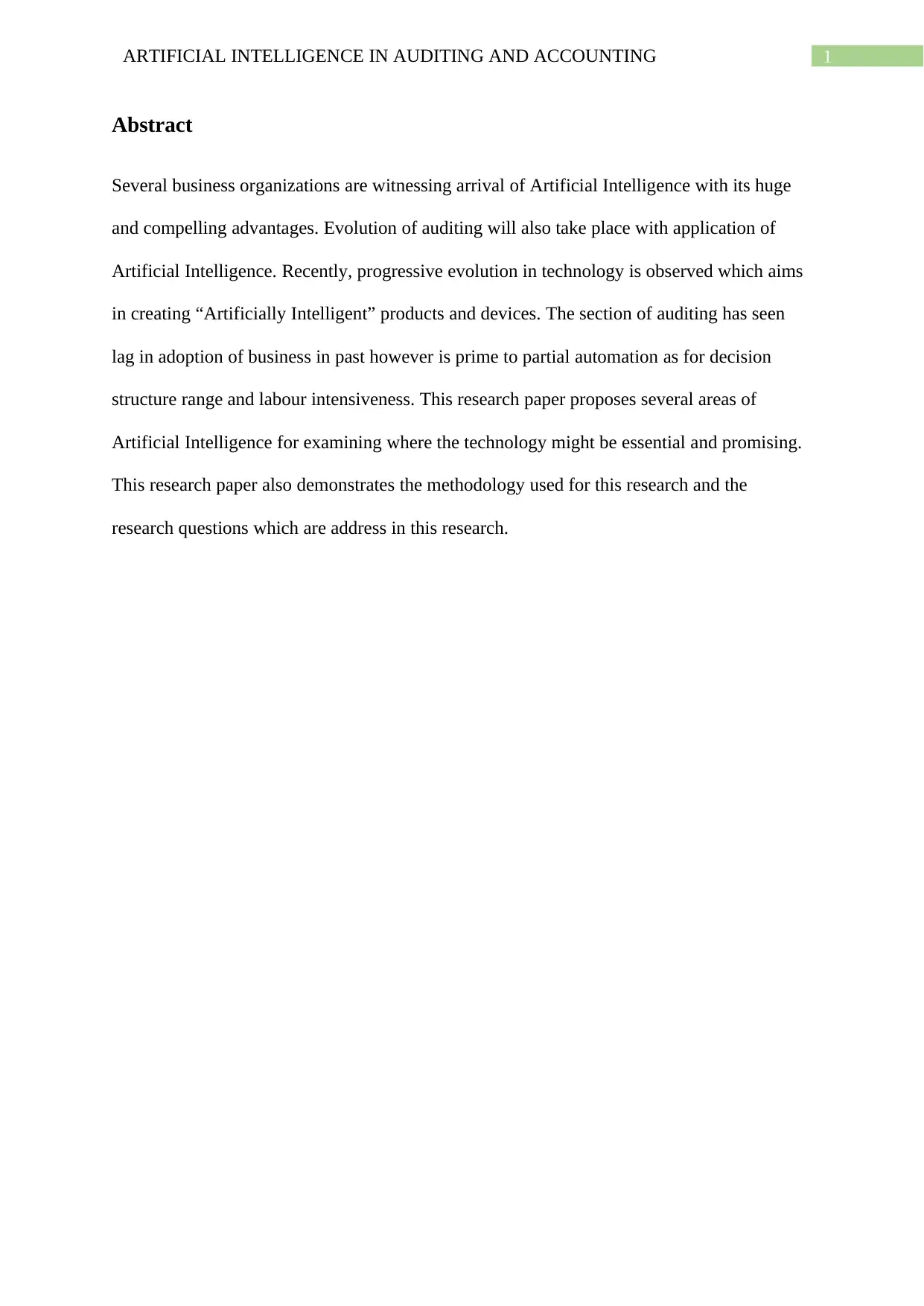
1ARTIFICIAL INTELLIGENCE IN AUDITING AND ACCOUNTING
Abstract
Several business organizations are witnessing arrival of Artificial Intelligence with its huge
and compelling advantages. Evolution of auditing will also take place with application of
Artificial Intelligence. Recently, progressive evolution in technology is observed which aims
in creating “Artificially Intelligent” products and devices. The section of auditing has seen
lag in adoption of business in past however is prime to partial automation as for decision
structure range and labour intensiveness. This research paper proposes several areas of
Artificial Intelligence for examining where the technology might be essential and promising.
This research paper also demonstrates the methodology used for this research and the
research questions which are address in this research.
Abstract
Several business organizations are witnessing arrival of Artificial Intelligence with its huge
and compelling advantages. Evolution of auditing will also take place with application of
Artificial Intelligence. Recently, progressive evolution in technology is observed which aims
in creating “Artificially Intelligent” products and devices. The section of auditing has seen
lag in adoption of business in past however is prime to partial automation as for decision
structure range and labour intensiveness. This research paper proposes several areas of
Artificial Intelligence for examining where the technology might be essential and promising.
This research paper also demonstrates the methodology used for this research and the
research questions which are address in this research.
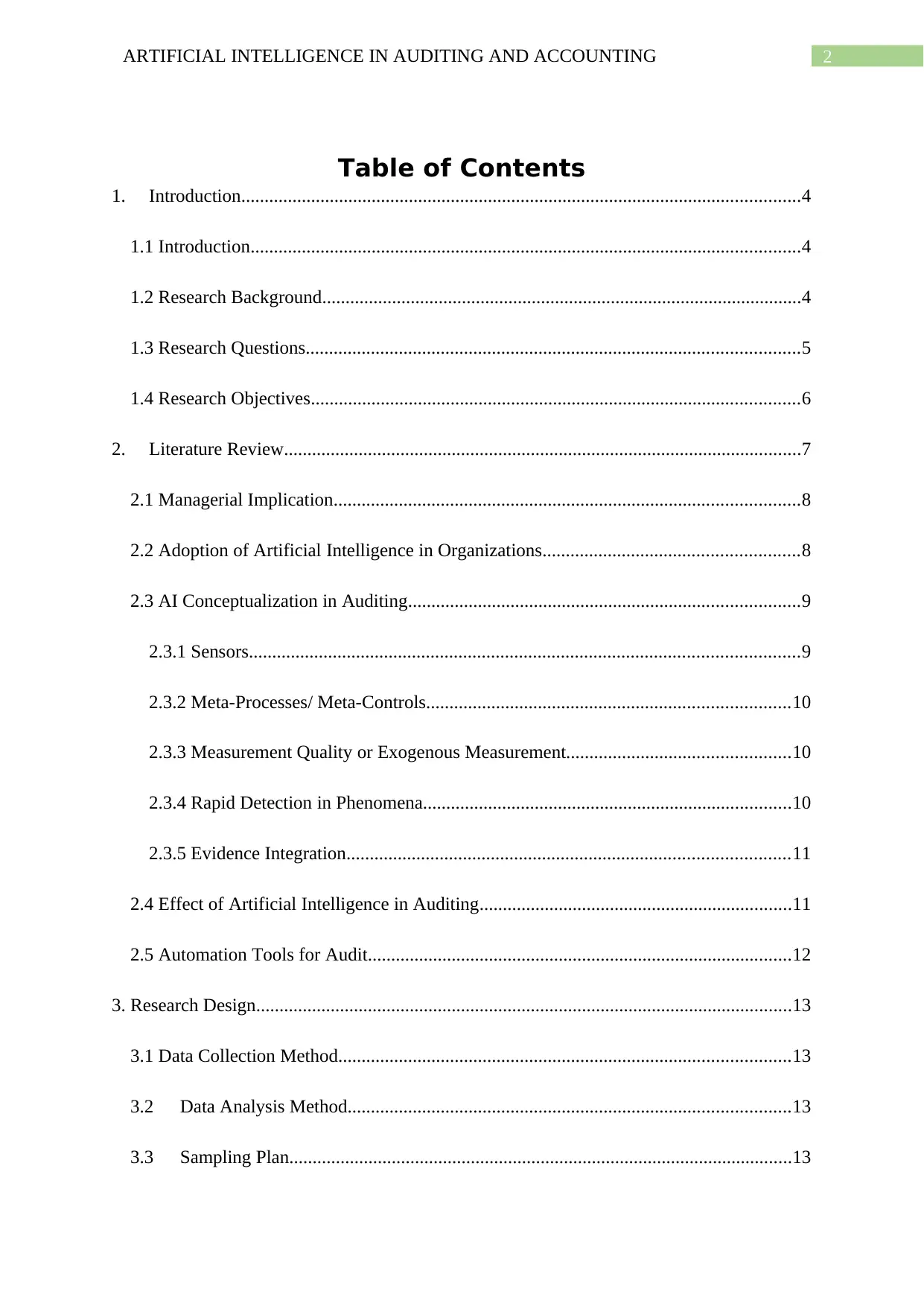
2ARTIFICIAL INTELLIGENCE IN AUDITING AND ACCOUNTING
Table of Contents
1. Introduction........................................................................................................................4
1.1 Introduction......................................................................................................................4
1.2 Research Background.......................................................................................................4
1.3 Research Questions..........................................................................................................5
1.4 Research Objectives.........................................................................................................6
2. Literature Review...............................................................................................................7
2.1 Managerial Implication....................................................................................................8
2.2 Adoption of Artificial Intelligence in Organizations.......................................................8
2.3 AI Conceptualization in Auditing....................................................................................9
2.3.1 Sensors......................................................................................................................9
2.3.2 Meta-Processes/ Meta-Controls..............................................................................10
2.3.3 Measurement Quality or Exogenous Measurement................................................10
2.3.4 Rapid Detection in Phenomena...............................................................................10
2.3.5 Evidence Integration...............................................................................................11
2.4 Effect of Artificial Intelligence in Auditing...................................................................11
2.5 Automation Tools for Audit...........................................................................................12
3. Research Design...................................................................................................................13
3.1 Data Collection Method.................................................................................................13
3.2 Data Analysis Method...............................................................................................13
3.3 Sampling Plan............................................................................................................13
Table of Contents
1. Introduction........................................................................................................................4
1.1 Introduction......................................................................................................................4
1.2 Research Background.......................................................................................................4
1.3 Research Questions..........................................................................................................5
1.4 Research Objectives.........................................................................................................6
2. Literature Review...............................................................................................................7
2.1 Managerial Implication....................................................................................................8
2.2 Adoption of Artificial Intelligence in Organizations.......................................................8
2.3 AI Conceptualization in Auditing....................................................................................9
2.3.1 Sensors......................................................................................................................9
2.3.2 Meta-Processes/ Meta-Controls..............................................................................10
2.3.3 Measurement Quality or Exogenous Measurement................................................10
2.3.4 Rapid Detection in Phenomena...............................................................................10
2.3.5 Evidence Integration...............................................................................................11
2.4 Effect of Artificial Intelligence in Auditing...................................................................11
2.5 Automation Tools for Audit...........................................................................................12
3. Research Design...................................................................................................................13
3.1 Data Collection Method.................................................................................................13
3.2 Data Analysis Method...............................................................................................13
3.3 Sampling Plan............................................................................................................13
⊘ This is a preview!⊘
Do you want full access?
Subscribe today to unlock all pages.

Trusted by 1+ million students worldwide
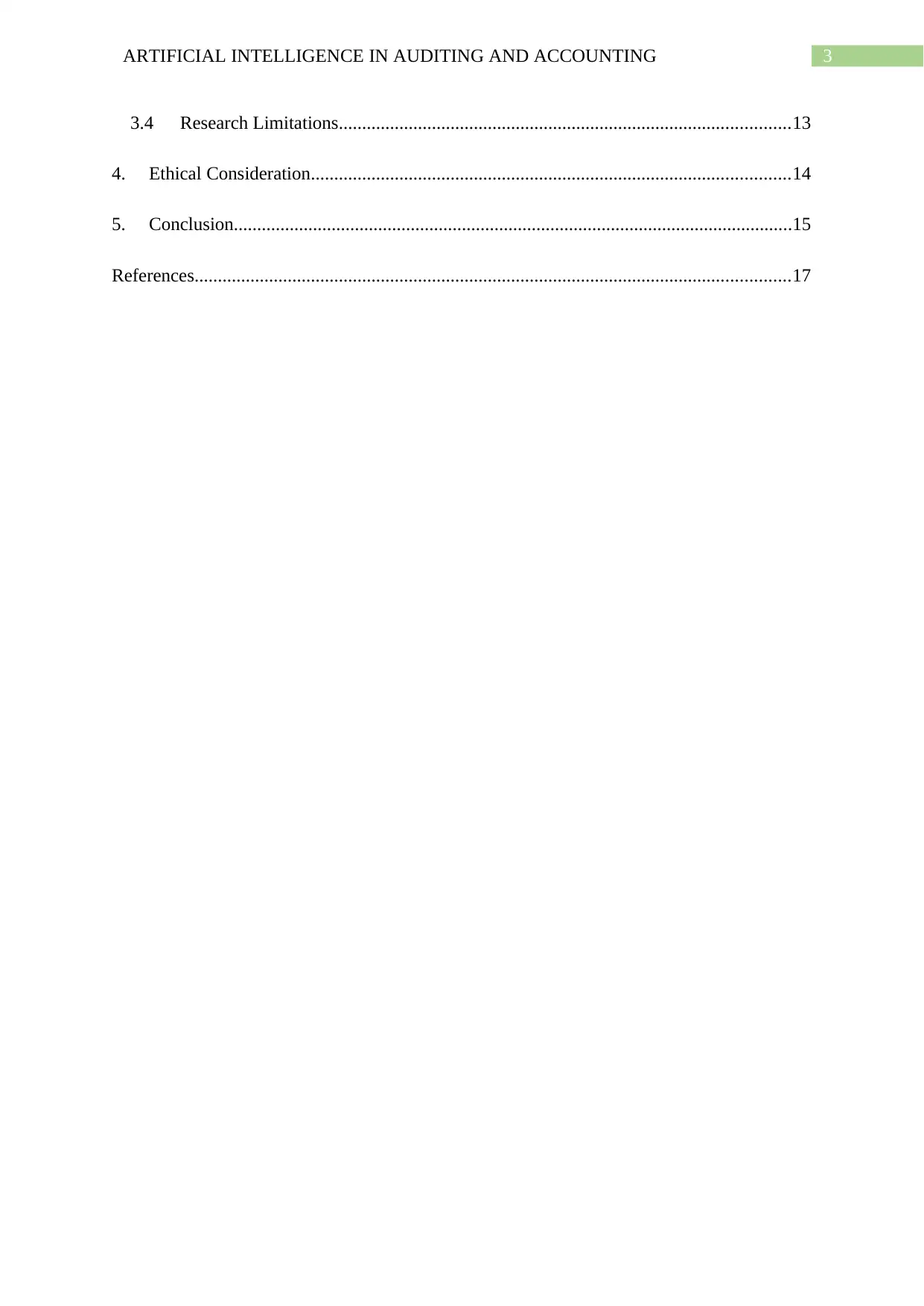
3ARTIFICIAL INTELLIGENCE IN AUDITING AND ACCOUNTING
3.4 Research Limitations.................................................................................................13
4. Ethical Consideration.......................................................................................................14
5. Conclusion........................................................................................................................15
References................................................................................................................................17
3.4 Research Limitations.................................................................................................13
4. Ethical Consideration.......................................................................................................14
5. Conclusion........................................................................................................................15
References................................................................................................................................17
Paraphrase This Document
Need a fresh take? Get an instant paraphrase of this document with our AI Paraphraser
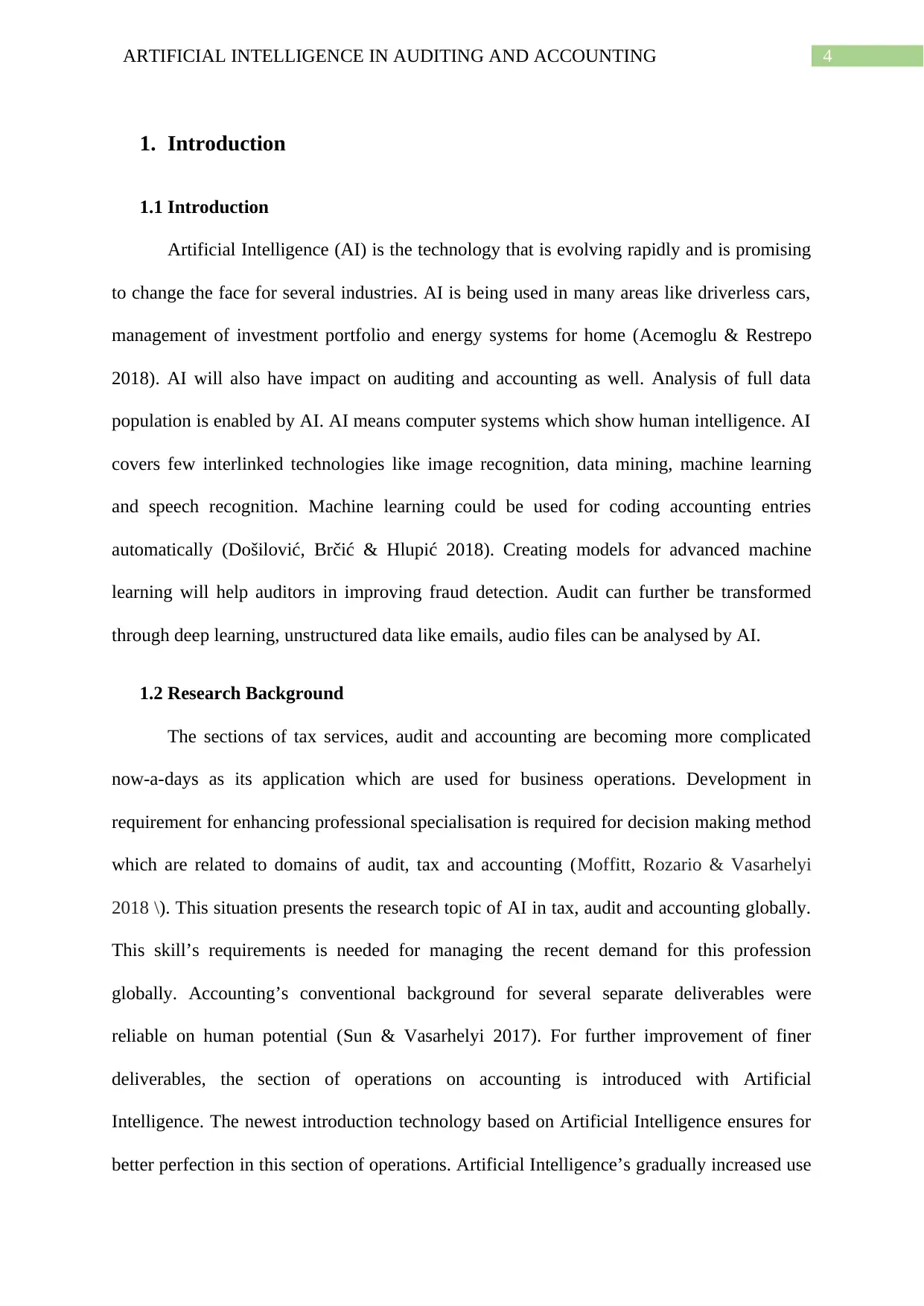
4ARTIFICIAL INTELLIGENCE IN AUDITING AND ACCOUNTING
1. Introduction
1.1 Introduction
Artificial Intelligence (AI) is the technology that is evolving rapidly and is promising
to change the face for several industries. AI is being used in many areas like driverless cars,
management of investment portfolio and energy systems for home (Acemoglu & Restrepo
2018). AI will also have impact on auditing and accounting as well. Analysis of full data
population is enabled by AI. AI means computer systems which show human intelligence. AI
covers few interlinked technologies like image recognition, data mining, machine learning
and speech recognition. Machine learning could be used for coding accounting entries
automatically (Došilović, Brčić & Hlupić 2018). Creating models for advanced machine
learning will help auditors in improving fraud detection. Audit can further be transformed
through deep learning, unstructured data like emails, audio files can be analysed by AI.
1.2 Research Background
The sections of tax services, audit and accounting are becoming more complicated
now-a-days as its application which are used for business operations. Development in
requirement for enhancing professional specialisation is required for decision making method
which are related to domains of audit, tax and accounting (Moffitt, Rozario & Vasarhelyi
2018 \). This situation presents the research topic of AI in tax, audit and accounting globally.
This skill’s requirements is needed for managing the recent demand for this profession
globally. Accounting’s conventional background for several separate deliverables were
reliable on human potential (Sun & Vasarhelyi 2017). For further improvement of finer
deliverables, the section of operations on accounting is introduced with Artificial
Intelligence. The newest introduction technology based on Artificial Intelligence ensures for
better perfection in this section of operations. Artificial Intelligence’s gradually increased use
1. Introduction
1.1 Introduction
Artificial Intelligence (AI) is the technology that is evolving rapidly and is promising
to change the face for several industries. AI is being used in many areas like driverless cars,
management of investment portfolio and energy systems for home (Acemoglu & Restrepo
2018). AI will also have impact on auditing and accounting as well. Analysis of full data
population is enabled by AI. AI means computer systems which show human intelligence. AI
covers few interlinked technologies like image recognition, data mining, machine learning
and speech recognition. Machine learning could be used for coding accounting entries
automatically (Došilović, Brčić & Hlupić 2018). Creating models for advanced machine
learning will help auditors in improving fraud detection. Audit can further be transformed
through deep learning, unstructured data like emails, audio files can be analysed by AI.
1.2 Research Background
The sections of tax services, audit and accounting are becoming more complicated
now-a-days as its application which are used for business operations. Development in
requirement for enhancing professional specialisation is required for decision making method
which are related to domains of audit, tax and accounting (Moffitt, Rozario & Vasarhelyi
2018 \). This situation presents the research topic of AI in tax, audit and accounting globally.
This skill’s requirements is needed for managing the recent demand for this profession
globally. Accounting’s conventional background for several separate deliverables were
reliable on human potential (Sun & Vasarhelyi 2017). For further improvement of finer
deliverables, the section of operations on accounting is introduced with Artificial
Intelligence. The newest introduction technology based on Artificial Intelligence ensures for
better perfection in this section of operations. Artificial Intelligence’s gradually increased use
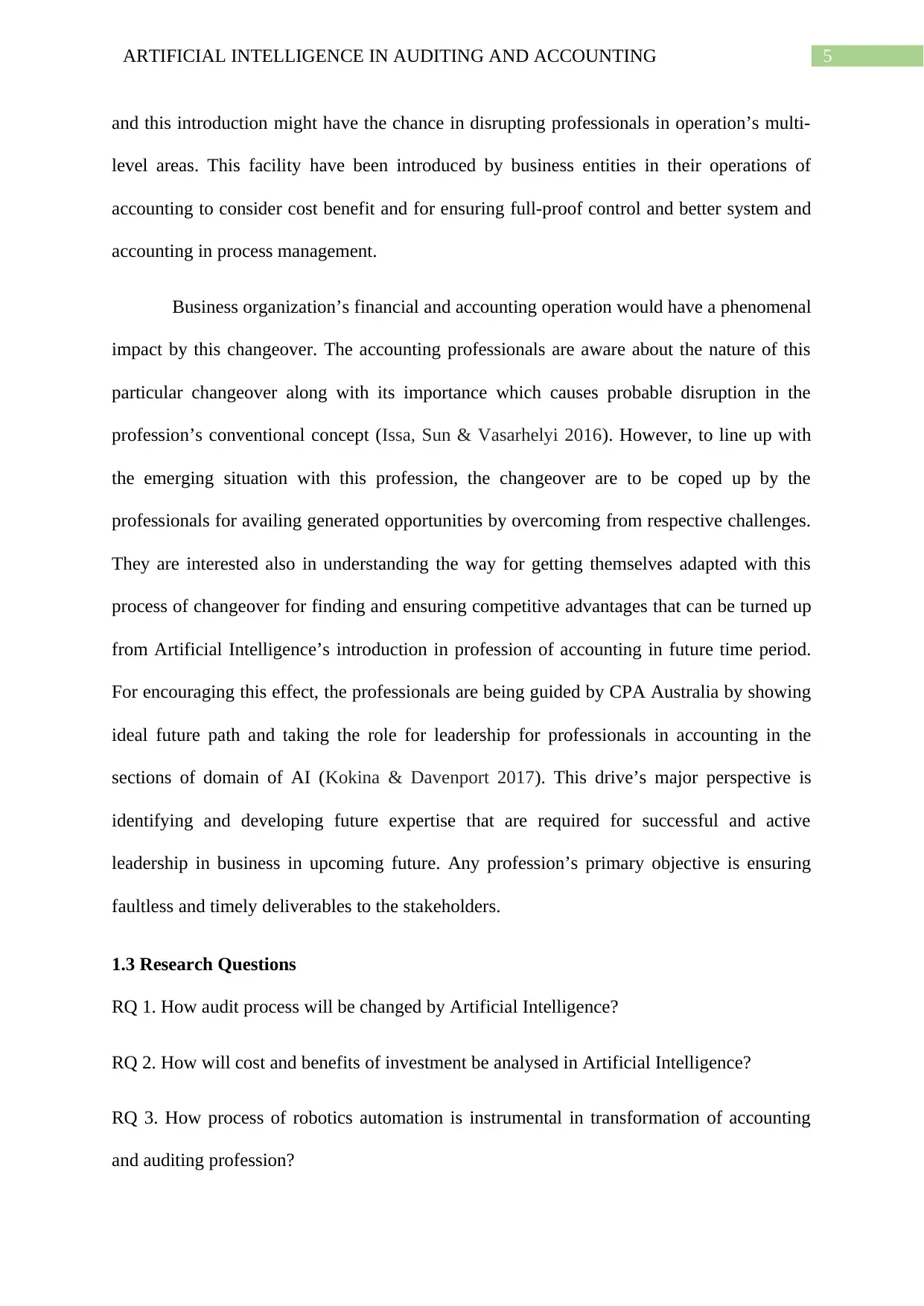
5ARTIFICIAL INTELLIGENCE IN AUDITING AND ACCOUNTING
and this introduction might have the chance in disrupting professionals in operation’s multi-
level areas. This facility have been introduced by business entities in their operations of
accounting to consider cost benefit and for ensuring full-proof control and better system and
accounting in process management.
Business organization’s financial and accounting operation would have a phenomenal
impact by this changeover. The accounting professionals are aware about the nature of this
particular changeover along with its importance which causes probable disruption in the
profession’s conventional concept (Issa, Sun & Vasarhelyi 2016). However, to line up with
the emerging situation with this profession, the changeover are to be coped up by the
professionals for availing generated opportunities by overcoming from respective challenges.
They are interested also in understanding the way for getting themselves adapted with this
process of changeover for finding and ensuring competitive advantages that can be turned up
from Artificial Intelligence’s introduction in profession of accounting in future time period.
For encouraging this effect, the professionals are being guided by CPA Australia by showing
ideal future path and taking the role for leadership for professionals in accounting in the
sections of domain of AI (Kokina & Davenport 2017). This drive’s major perspective is
identifying and developing future expertise that are required for successful and active
leadership in business in upcoming future. Any profession’s primary objective is ensuring
faultless and timely deliverables to the stakeholders.
1.3 Research Questions
RQ 1. How audit process will be changed by Artificial Intelligence?
RQ 2. How will cost and benefits of investment be analysed in Artificial Intelligence?
RQ 3. How process of robotics automation is instrumental in transformation of accounting
and auditing profession?
and this introduction might have the chance in disrupting professionals in operation’s multi-
level areas. This facility have been introduced by business entities in their operations of
accounting to consider cost benefit and for ensuring full-proof control and better system and
accounting in process management.
Business organization’s financial and accounting operation would have a phenomenal
impact by this changeover. The accounting professionals are aware about the nature of this
particular changeover along with its importance which causes probable disruption in the
profession’s conventional concept (Issa, Sun & Vasarhelyi 2016). However, to line up with
the emerging situation with this profession, the changeover are to be coped up by the
professionals for availing generated opportunities by overcoming from respective challenges.
They are interested also in understanding the way for getting themselves adapted with this
process of changeover for finding and ensuring competitive advantages that can be turned up
from Artificial Intelligence’s introduction in profession of accounting in future time period.
For encouraging this effect, the professionals are being guided by CPA Australia by showing
ideal future path and taking the role for leadership for professionals in accounting in the
sections of domain of AI (Kokina & Davenport 2017). This drive’s major perspective is
identifying and developing future expertise that are required for successful and active
leadership in business in upcoming future. Any profession’s primary objective is ensuring
faultless and timely deliverables to the stakeholders.
1.3 Research Questions
RQ 1. How audit process will be changed by Artificial Intelligence?
RQ 2. How will cost and benefits of investment be analysed in Artificial Intelligence?
RQ 3. How process of robotics automation is instrumental in transformation of accounting
and auditing profession?
⊘ This is a preview!⊘
Do you want full access?
Subscribe today to unlock all pages.

Trusted by 1+ million students worldwide
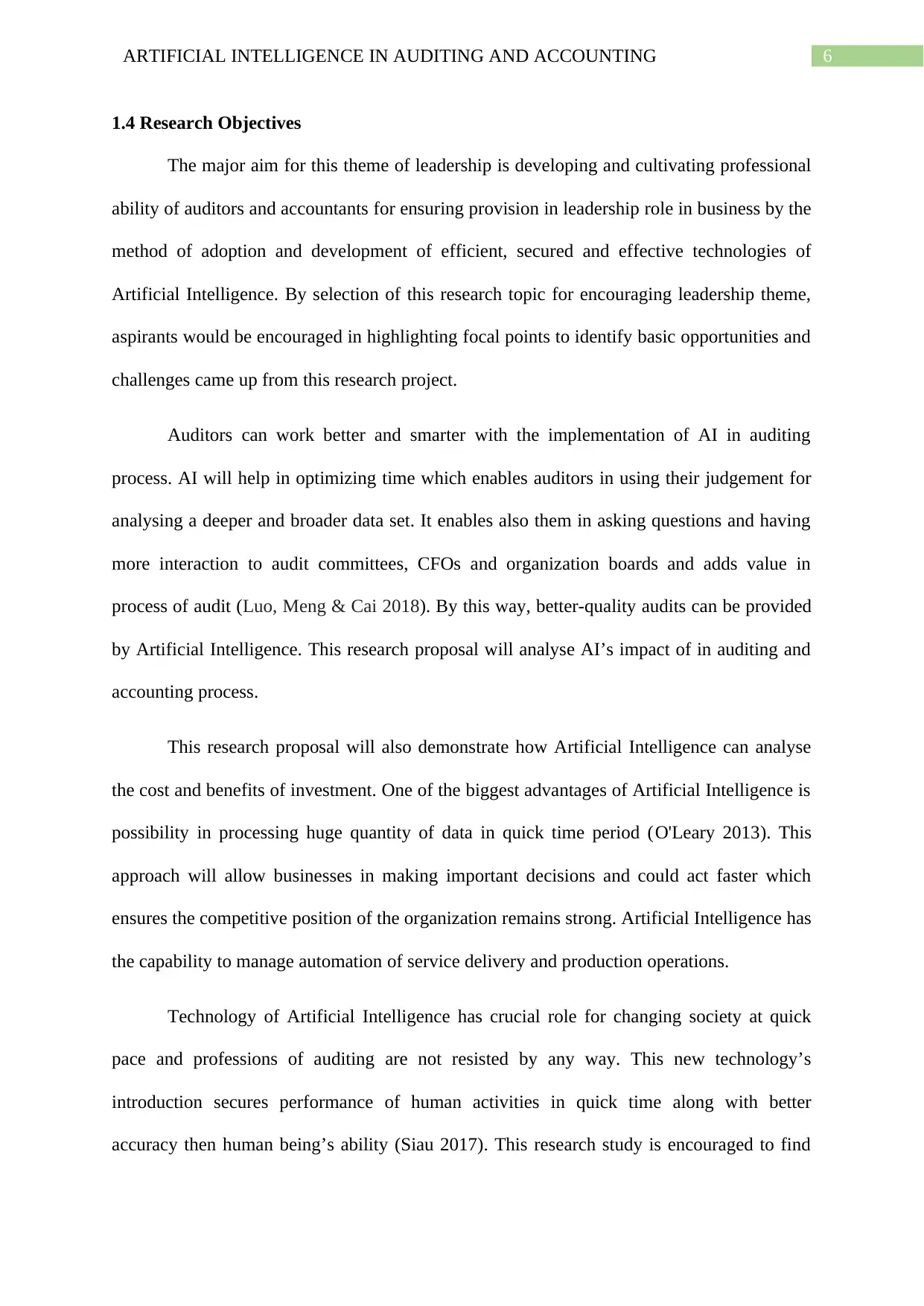
6ARTIFICIAL INTELLIGENCE IN AUDITING AND ACCOUNTING
1.4 Research Objectives
The major aim for this theme of leadership is developing and cultivating professional
ability of auditors and accountants for ensuring provision in leadership role in business by the
method of adoption and development of efficient, secured and effective technologies of
Artificial Intelligence. By selection of this research topic for encouraging leadership theme,
aspirants would be encouraged in highlighting focal points to identify basic opportunities and
challenges came up from this research project.
Auditors can work better and smarter with the implementation of AI in auditing
process. AI will help in optimizing time which enables auditors in using their judgement for
analysing a deeper and broader data set. It enables also them in asking questions and having
more interaction to audit committees, CFOs and organization boards and adds value in
process of audit (Luo, Meng & Cai 2018). By this way, better-quality audits can be provided
by Artificial Intelligence. This research proposal will analyse AI’s impact of in auditing and
accounting process.
This research proposal will also demonstrate how Artificial Intelligence can analyse
the cost and benefits of investment. One of the biggest advantages of Artificial Intelligence is
possibility in processing huge quantity of data in quick time period (O'Leary 2013). This
approach will allow businesses in making important decisions and could act faster which
ensures the competitive position of the organization remains strong. Artificial Intelligence has
the capability to manage automation of service delivery and production operations.
Technology of Artificial Intelligence has crucial role for changing society at quick
pace and professions of auditing are not resisted by any way. This new technology’s
introduction secures performance of human activities in quick time along with better
accuracy then human being’s ability (Siau 2017). This research study is encouraged to find
1.4 Research Objectives
The major aim for this theme of leadership is developing and cultivating professional
ability of auditors and accountants for ensuring provision in leadership role in business by the
method of adoption and development of efficient, secured and effective technologies of
Artificial Intelligence. By selection of this research topic for encouraging leadership theme,
aspirants would be encouraged in highlighting focal points to identify basic opportunities and
challenges came up from this research project.
Auditors can work better and smarter with the implementation of AI in auditing
process. AI will help in optimizing time which enables auditors in using their judgement for
analysing a deeper and broader data set. It enables also them in asking questions and having
more interaction to audit committees, CFOs and organization boards and adds value in
process of audit (Luo, Meng & Cai 2018). By this way, better-quality audits can be provided
by Artificial Intelligence. This research proposal will analyse AI’s impact of in auditing and
accounting process.
This research proposal will also demonstrate how Artificial Intelligence can analyse
the cost and benefits of investment. One of the biggest advantages of Artificial Intelligence is
possibility in processing huge quantity of data in quick time period (O'Leary 2013). This
approach will allow businesses in making important decisions and could act faster which
ensures the competitive position of the organization remains strong. Artificial Intelligence has
the capability to manage automation of service delivery and production operations.
Technology of Artificial Intelligence has crucial role for changing society at quick
pace and professions of auditing are not resisted by any way. This new technology’s
introduction secures performance of human activities in quick time along with better
accuracy then human being’s ability (Siau 2017). This research study is encouraged to find
Paraphrase This Document
Need a fresh take? Get an instant paraphrase of this document with our AI Paraphraser
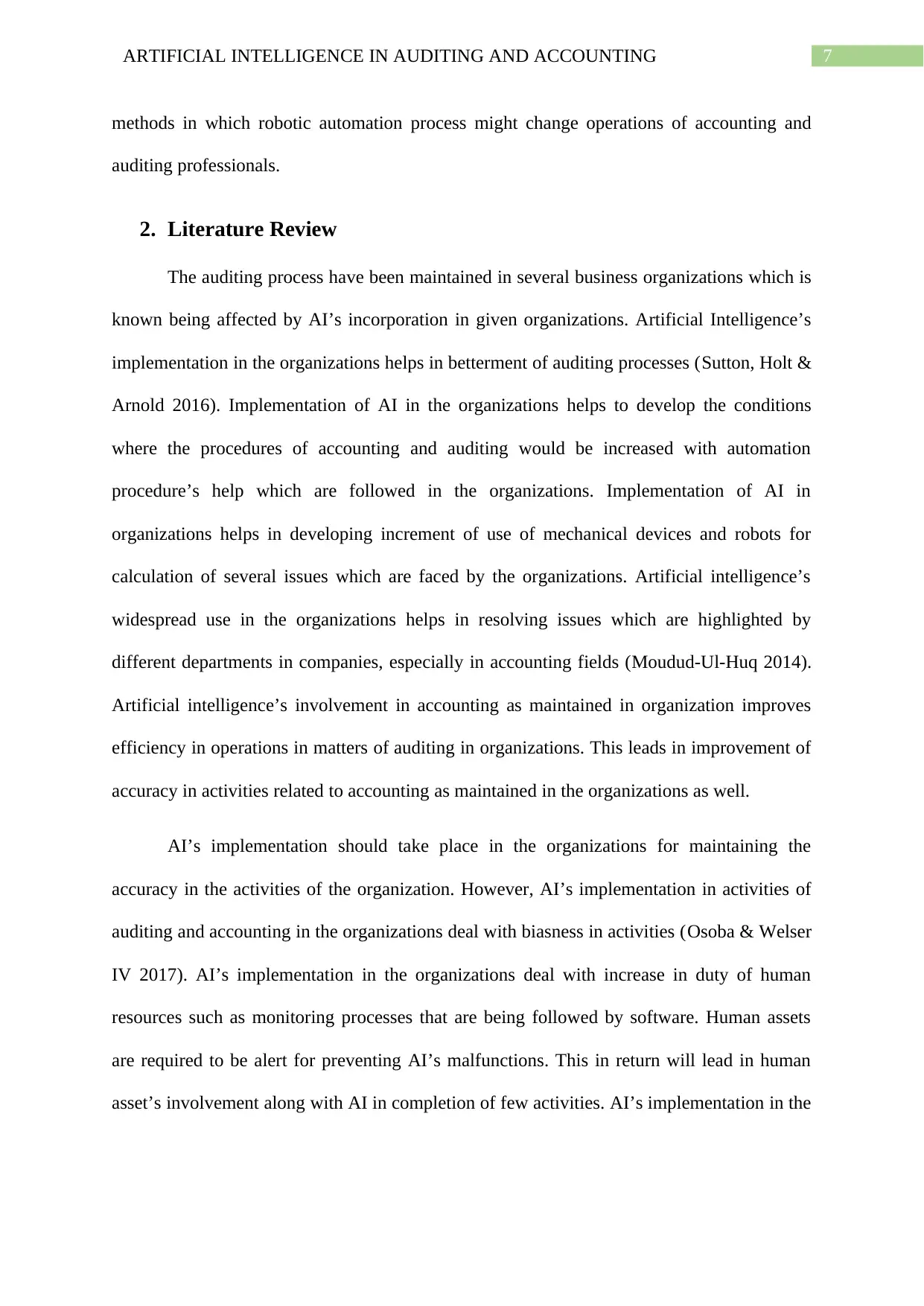
7ARTIFICIAL INTELLIGENCE IN AUDITING AND ACCOUNTING
methods in which robotic automation process might change operations of accounting and
auditing professionals.
2. Literature Review
The auditing process have been maintained in several business organizations which is
known being affected by AI’s incorporation in given organizations. Artificial Intelligence’s
implementation in the organizations helps in betterment of auditing processes (Sutton, Holt &
Arnold 2016). Implementation of AI in the organizations helps to develop the conditions
where the procedures of accounting and auditing would be increased with automation
procedure’s help which are followed in the organizations. Implementation of AI in
organizations helps in developing increment of use of mechanical devices and robots for
calculation of several issues which are faced by the organizations. Artificial intelligence’s
widespread use in the organizations helps in resolving issues which are highlighted by
different departments in companies, especially in accounting fields (Moudud-Ul-Huq 2014).
Artificial intelligence’s involvement in accounting as maintained in organization improves
efficiency in operations in matters of auditing in organizations. This leads in improvement of
accuracy in activities related to accounting as maintained in the organizations as well.
AI’s implementation should take place in the organizations for maintaining the
accuracy in the activities of the organization. However, AI’s implementation in activities of
auditing and accounting in the organizations deal with biasness in activities (Osoba & Welser
IV 2017). AI’s implementation in the organizations deal with increase in duty of human
resources such as monitoring processes that are being followed by software. Human assets
are required to be alert for preventing AI’s malfunctions. This in return will lead in human
asset’s involvement along with AI in completion of few activities. AI’s implementation in the
methods in which robotic automation process might change operations of accounting and
auditing professionals.
2. Literature Review
The auditing process have been maintained in several business organizations which is
known being affected by AI’s incorporation in given organizations. Artificial Intelligence’s
implementation in the organizations helps in betterment of auditing processes (Sutton, Holt &
Arnold 2016). Implementation of AI in the organizations helps to develop the conditions
where the procedures of accounting and auditing would be increased with automation
procedure’s help which are followed in the organizations. Implementation of AI in
organizations helps in developing increment of use of mechanical devices and robots for
calculation of several issues which are faced by the organizations. Artificial intelligence’s
widespread use in the organizations helps in resolving issues which are highlighted by
different departments in companies, especially in accounting fields (Moudud-Ul-Huq 2014).
Artificial intelligence’s involvement in accounting as maintained in organization improves
efficiency in operations in matters of auditing in organizations. This leads in improvement of
accuracy in activities related to accounting as maintained in the organizations as well.
AI’s implementation should take place in the organizations for maintaining the
accuracy in the activities of the organization. However, AI’s implementation in activities of
auditing and accounting in the organizations deal with biasness in activities (Osoba & Welser
IV 2017). AI’s implementation in the organizations deal with increase in duty of human
resources such as monitoring processes that are being followed by software. Human assets
are required to be alert for preventing AI’s malfunctions. This in return will lead in human
asset’s involvement along with AI in completion of few activities. AI’s implementation in the
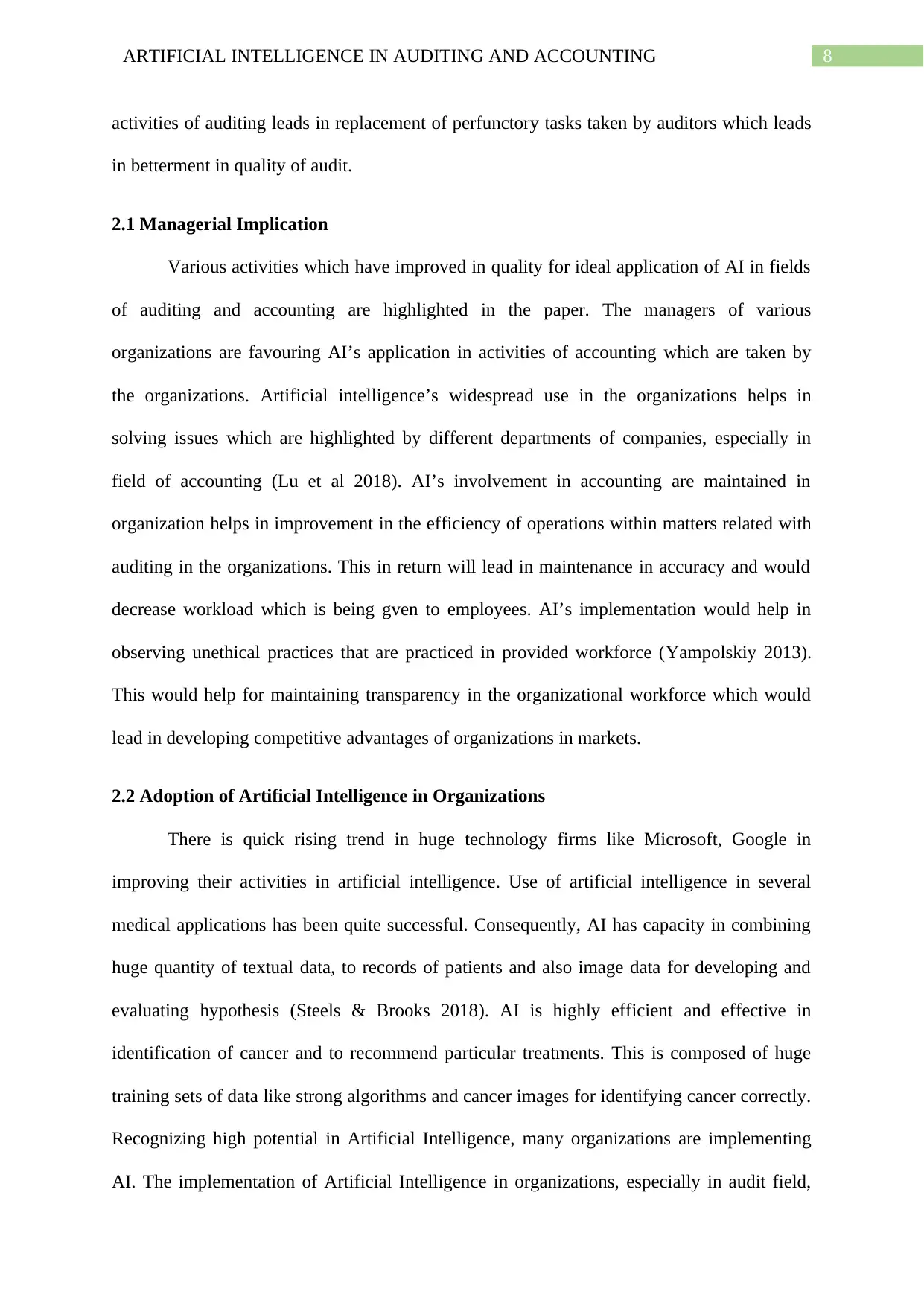
8ARTIFICIAL INTELLIGENCE IN AUDITING AND ACCOUNTING
activities of auditing leads in replacement of perfunctory tasks taken by auditors which leads
in betterment in quality of audit.
2.1 Managerial Implication
Various activities which have improved in quality for ideal application of AI in fields
of auditing and accounting are highlighted in the paper. The managers of various
organizations are favouring AI’s application in activities of accounting which are taken by
the organizations. Artificial intelligence’s widespread use in the organizations helps in
solving issues which are highlighted by different departments of companies, especially in
field of accounting (Lu et al 2018). AI’s involvement in accounting are maintained in
organization helps in improvement in the efficiency of operations within matters related with
auditing in the organizations. This in return will lead in maintenance in accuracy and would
decrease workload which is being gven to employees. AI’s implementation would help in
observing unethical practices that are practiced in provided workforce (Yampolskiy 2013).
This would help for maintaining transparency in the organizational workforce which would
lead in developing competitive advantages of organizations in markets.
2.2 Adoption of Artificial Intelligence in Organizations
There is quick rising trend in huge technology firms like Microsoft, Google in
improving their activities in artificial intelligence. Use of artificial intelligence in several
medical applications has been quite successful. Consequently, AI has capacity in combining
huge quantity of textual data, to records of patients and also image data for developing and
evaluating hypothesis (Steels & Brooks 2018). AI is highly efficient and effective in
identification of cancer and to recommend particular treatments. This is composed of huge
training sets of data like strong algorithms and cancer images for identifying cancer correctly.
Recognizing high potential in Artificial Intelligence, many organizations are implementing
AI. The implementation of Artificial Intelligence in organizations, especially in audit field,
activities of auditing leads in replacement of perfunctory tasks taken by auditors which leads
in betterment in quality of audit.
2.1 Managerial Implication
Various activities which have improved in quality for ideal application of AI in fields
of auditing and accounting are highlighted in the paper. The managers of various
organizations are favouring AI’s application in activities of accounting which are taken by
the organizations. Artificial intelligence’s widespread use in the organizations helps in
solving issues which are highlighted by different departments of companies, especially in
field of accounting (Lu et al 2018). AI’s involvement in accounting are maintained in
organization helps in improvement in the efficiency of operations within matters related with
auditing in the organizations. This in return will lead in maintenance in accuracy and would
decrease workload which is being gven to employees. AI’s implementation would help in
observing unethical practices that are practiced in provided workforce (Yampolskiy 2013).
This would help for maintaining transparency in the organizational workforce which would
lead in developing competitive advantages of organizations in markets.
2.2 Adoption of Artificial Intelligence in Organizations
There is quick rising trend in huge technology firms like Microsoft, Google in
improving their activities in artificial intelligence. Use of artificial intelligence in several
medical applications has been quite successful. Consequently, AI has capacity in combining
huge quantity of textual data, to records of patients and also image data for developing and
evaluating hypothesis (Steels & Brooks 2018). AI is highly efficient and effective in
identification of cancer and to recommend particular treatments. This is composed of huge
training sets of data like strong algorithms and cancer images for identifying cancer correctly.
Recognizing high potential in Artificial Intelligence, many organizations are implementing
AI. The implementation of Artificial Intelligence in organizations, especially in audit field,
⊘ This is a preview!⊘
Do you want full access?
Subscribe today to unlock all pages.

Trusted by 1+ million students worldwide
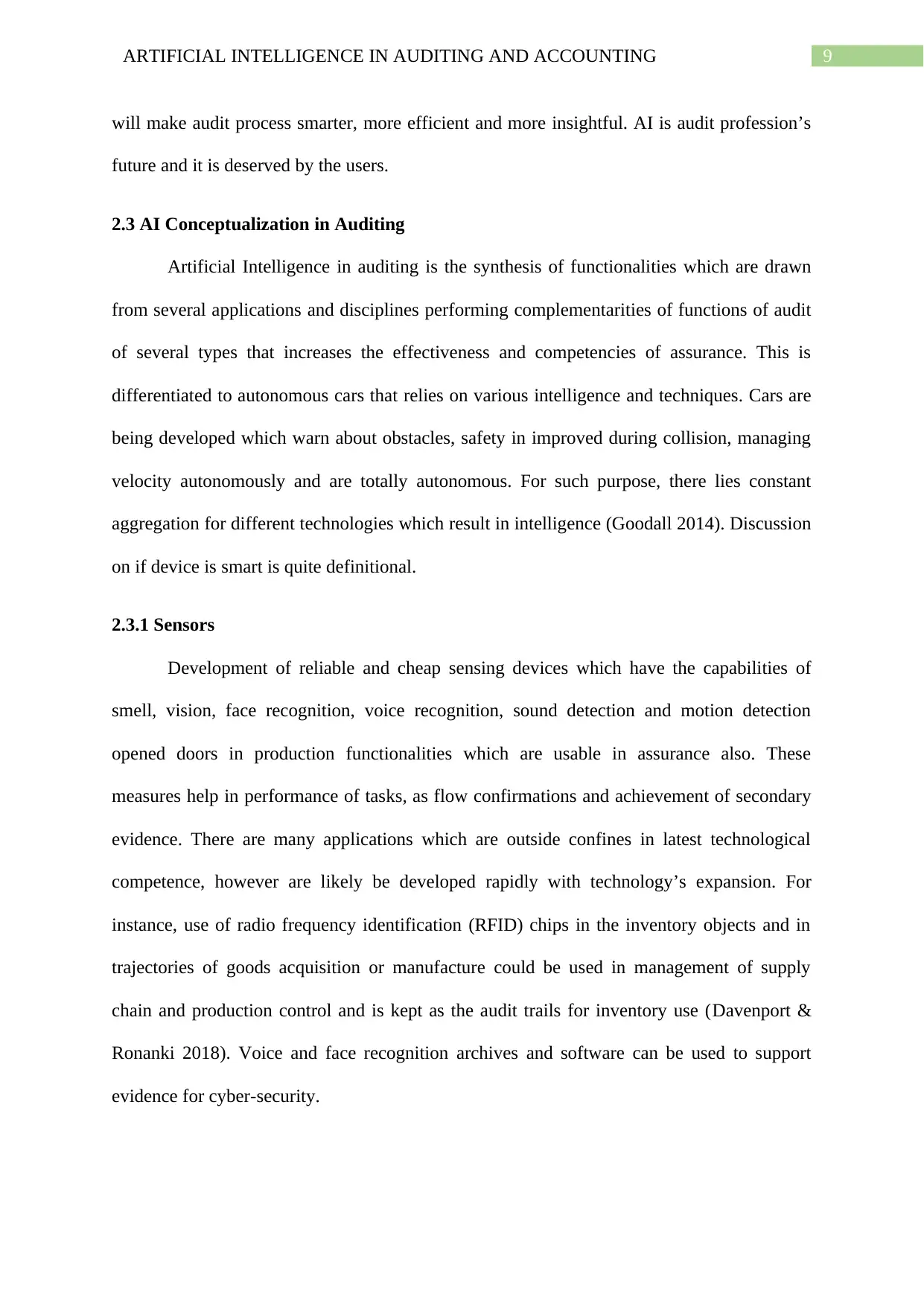
9ARTIFICIAL INTELLIGENCE IN AUDITING AND ACCOUNTING
will make audit process smarter, more efficient and more insightful. AI is audit profession’s
future and it is deserved by the users.
2.3 AI Conceptualization in Auditing
Artificial Intelligence in auditing is the synthesis of functionalities which are drawn
from several applications and disciplines performing complementarities of functions of audit
of several types that increases the effectiveness and competencies of assurance. This is
differentiated to autonomous cars that relies on various intelligence and techniques. Cars are
being developed which warn about obstacles, safety in improved during collision, managing
velocity autonomously and are totally autonomous. For such purpose, there lies constant
aggregation for different technologies which result in intelligence (Goodall 2014). Discussion
on if device is smart is quite definitional.
2.3.1 Sensors
Development of reliable and cheap sensing devices which have the capabilities of
smell, vision, face recognition, voice recognition, sound detection and motion detection
opened doors in production functionalities which are usable in assurance also. These
measures help in performance of tasks, as flow confirmations and achievement of secondary
evidence. There are many applications which are outside confines in latest technological
competence, however are likely be developed rapidly with technology’s expansion. For
instance, use of radio frequency identification (RFID) chips in the inventory objects and in
trajectories of goods acquisition or manufacture could be used in management of supply
chain and production control and is kept as the audit trails for inventory use (Davenport &
Ronanki 2018). Voice and face recognition archives and software can be used to support
evidence for cyber-security.
will make audit process smarter, more efficient and more insightful. AI is audit profession’s
future and it is deserved by the users.
2.3 AI Conceptualization in Auditing
Artificial Intelligence in auditing is the synthesis of functionalities which are drawn
from several applications and disciplines performing complementarities of functions of audit
of several types that increases the effectiveness and competencies of assurance. This is
differentiated to autonomous cars that relies on various intelligence and techniques. Cars are
being developed which warn about obstacles, safety in improved during collision, managing
velocity autonomously and are totally autonomous. For such purpose, there lies constant
aggregation for different technologies which result in intelligence (Goodall 2014). Discussion
on if device is smart is quite definitional.
2.3.1 Sensors
Development of reliable and cheap sensing devices which have the capabilities of
smell, vision, face recognition, voice recognition, sound detection and motion detection
opened doors in production functionalities which are usable in assurance also. These
measures help in performance of tasks, as flow confirmations and achievement of secondary
evidence. There are many applications which are outside confines in latest technological
competence, however are likely be developed rapidly with technology’s expansion. For
instance, use of radio frequency identification (RFID) chips in the inventory objects and in
trajectories of goods acquisition or manufacture could be used in management of supply
chain and production control and is kept as the audit trails for inventory use (Davenport &
Ronanki 2018). Voice and face recognition archives and software can be used to support
evidence for cyber-security.
Paraphrase This Document
Need a fresh take? Get an instant paraphrase of this document with our AI Paraphraser
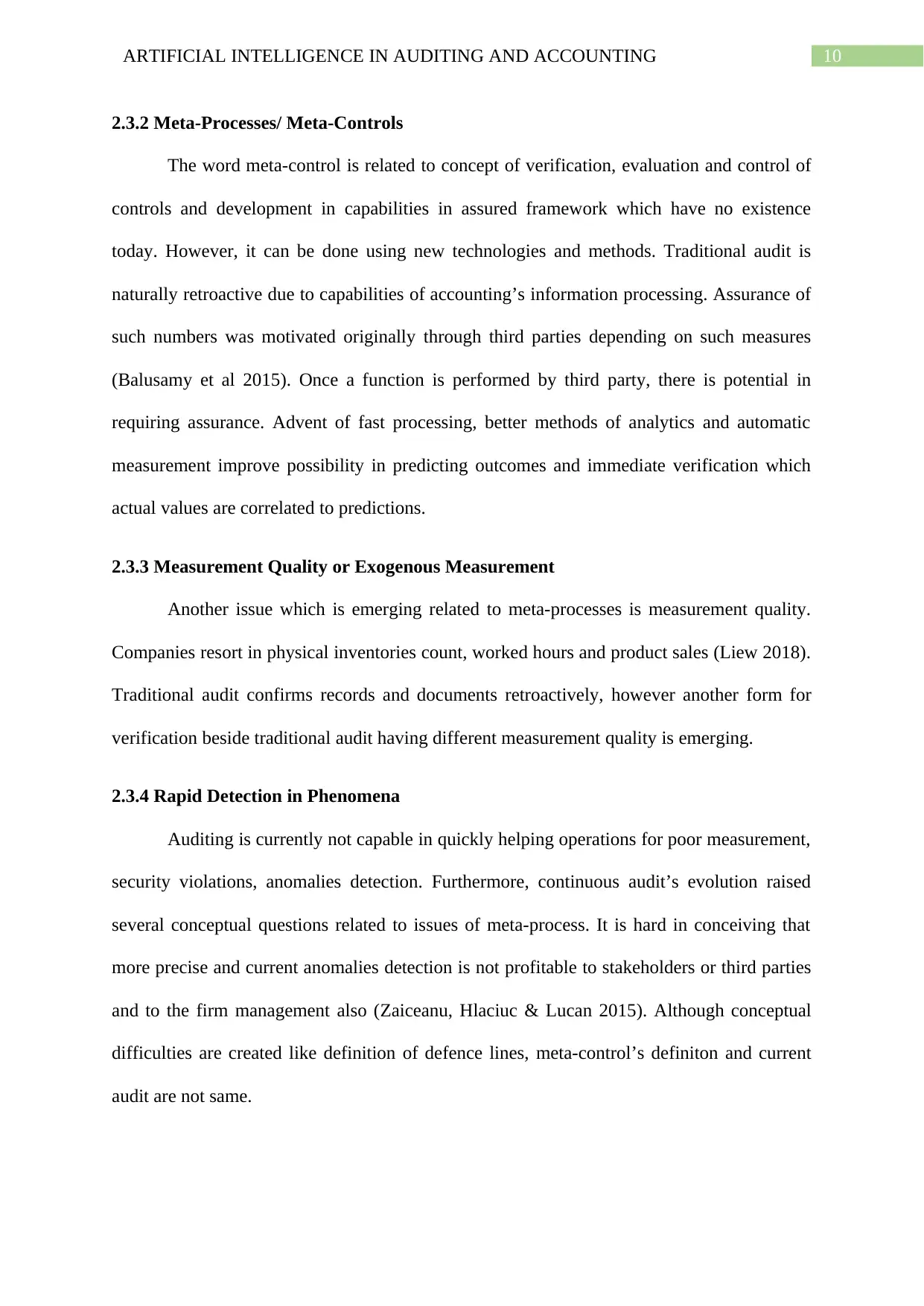
10ARTIFICIAL INTELLIGENCE IN AUDITING AND ACCOUNTING
2.3.2 Meta-Processes/ Meta-Controls
The word meta-control is related to concept of verification, evaluation and control of
controls and development in capabilities in assured framework which have no existence
today. However, it can be done using new technologies and methods. Traditional audit is
naturally retroactive due to capabilities of accounting’s information processing. Assurance of
such numbers was motivated originally through third parties depending on such measures
(Balusamy et al 2015). Once a function is performed by third party, there is potential in
requiring assurance. Advent of fast processing, better methods of analytics and automatic
measurement improve possibility in predicting outcomes and immediate verification which
actual values are correlated to predictions.
2.3.3 Measurement Quality or Exogenous Measurement
Another issue which is emerging related to meta-processes is measurement quality.
Companies resort in physical inventories count, worked hours and product sales (Liew 2018).
Traditional audit confirms records and documents retroactively, however another form for
verification beside traditional audit having different measurement quality is emerging.
2.3.4 Rapid Detection in Phenomena
Auditing is currently not capable in quickly helping operations for poor measurement,
security violations, anomalies detection. Furthermore, continuous audit’s evolution raised
several conceptual questions related to issues of meta-process. It is hard in conceiving that
more precise and current anomalies detection is not profitable to stakeholders or third parties
and to the firm management also (Zaiceanu, Hlaciuc & Lucan 2015). Although conceptual
difficulties are created like definition of defence lines, meta-control’s definiton and current
audit are not same.
2.3.2 Meta-Processes/ Meta-Controls
The word meta-control is related to concept of verification, evaluation and control of
controls and development in capabilities in assured framework which have no existence
today. However, it can be done using new technologies and methods. Traditional audit is
naturally retroactive due to capabilities of accounting’s information processing. Assurance of
such numbers was motivated originally through third parties depending on such measures
(Balusamy et al 2015). Once a function is performed by third party, there is potential in
requiring assurance. Advent of fast processing, better methods of analytics and automatic
measurement improve possibility in predicting outcomes and immediate verification which
actual values are correlated to predictions.
2.3.3 Measurement Quality or Exogenous Measurement
Another issue which is emerging related to meta-processes is measurement quality.
Companies resort in physical inventories count, worked hours and product sales (Liew 2018).
Traditional audit confirms records and documents retroactively, however another form for
verification beside traditional audit having different measurement quality is emerging.
2.3.4 Rapid Detection in Phenomena
Auditing is currently not capable in quickly helping operations for poor measurement,
security violations, anomalies detection. Furthermore, continuous audit’s evolution raised
several conceptual questions related to issues of meta-process. It is hard in conceiving that
more precise and current anomalies detection is not profitable to stakeholders or third parties
and to the firm management also (Zaiceanu, Hlaciuc & Lucan 2015). Although conceptual
difficulties are created like definition of defence lines, meta-control’s definiton and current
audit are not same.
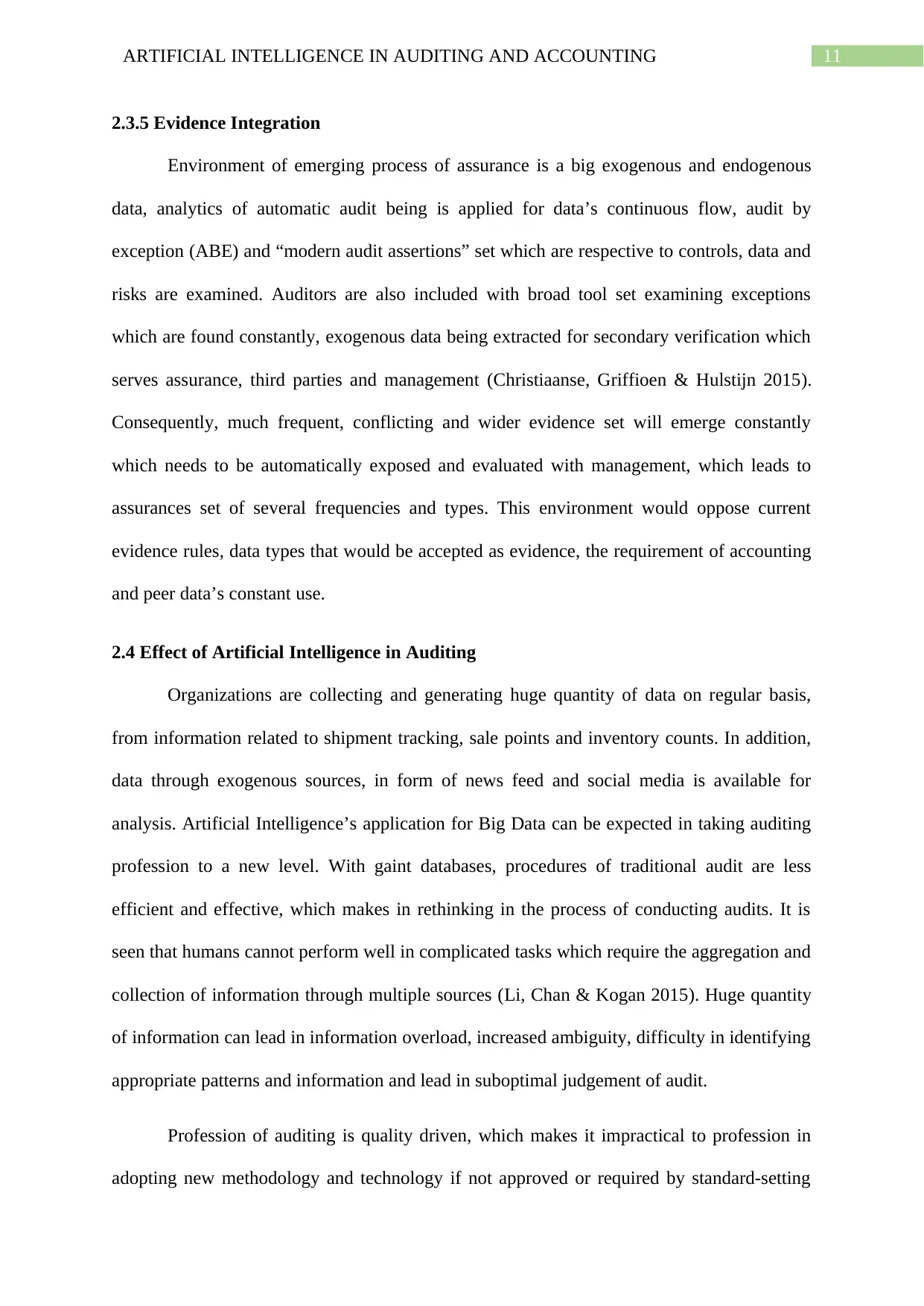
11ARTIFICIAL INTELLIGENCE IN AUDITING AND ACCOUNTING
2.3.5 Evidence Integration
Environment of emerging process of assurance is a big exogenous and endogenous
data, analytics of automatic audit being is applied for data’s continuous flow, audit by
exception (ABE) and “modern audit assertions” set which are respective to controls, data and
risks are examined. Auditors are also included with broad tool set examining exceptions
which are found constantly, exogenous data being extracted for secondary verification which
serves assurance, third parties and management (Christiaanse, Griffioen & Hulstijn 2015).
Consequently, much frequent, conflicting and wider evidence set will emerge constantly
which needs to be automatically exposed and evaluated with management, which leads to
assurances set of several frequencies and types. This environment would oppose current
evidence rules, data types that would be accepted as evidence, the requirement of accounting
and peer data’s constant use.
2.4 Effect of Artificial Intelligence in Auditing
Organizations are collecting and generating huge quantity of data on regular basis,
from information related to shipment tracking, sale points and inventory counts. In addition,
data through exogenous sources, in form of news feed and social media is available for
analysis. Artificial Intelligence’s application for Big Data can be expected in taking auditing
profession to a new level. With gaint databases, procedures of traditional audit are less
efficient and effective, which makes in rethinking in the process of conducting audits. It is
seen that humans cannot perform well in complicated tasks which require the aggregation and
collection of information through multiple sources (Li, Chan & Kogan 2015). Huge quantity
of information can lead in information overload, increased ambiguity, difficulty in identifying
appropriate patterns and information and lead in suboptimal judgement of audit.
Profession of auditing is quality driven, which makes it impractical to profession in
adopting new methodology and technology if not approved or required by standard-setting
2.3.5 Evidence Integration
Environment of emerging process of assurance is a big exogenous and endogenous
data, analytics of automatic audit being is applied for data’s continuous flow, audit by
exception (ABE) and “modern audit assertions” set which are respective to controls, data and
risks are examined. Auditors are also included with broad tool set examining exceptions
which are found constantly, exogenous data being extracted for secondary verification which
serves assurance, third parties and management (Christiaanse, Griffioen & Hulstijn 2015).
Consequently, much frequent, conflicting and wider evidence set will emerge constantly
which needs to be automatically exposed and evaluated with management, which leads to
assurances set of several frequencies and types. This environment would oppose current
evidence rules, data types that would be accepted as evidence, the requirement of accounting
and peer data’s constant use.
2.4 Effect of Artificial Intelligence in Auditing
Organizations are collecting and generating huge quantity of data on regular basis,
from information related to shipment tracking, sale points and inventory counts. In addition,
data through exogenous sources, in form of news feed and social media is available for
analysis. Artificial Intelligence’s application for Big Data can be expected in taking auditing
profession to a new level. With gaint databases, procedures of traditional audit are less
efficient and effective, which makes in rethinking in the process of conducting audits. It is
seen that humans cannot perform well in complicated tasks which require the aggregation and
collection of information through multiple sources (Li, Chan & Kogan 2015). Huge quantity
of information can lead in information overload, increased ambiguity, difficulty in identifying
appropriate patterns and information and lead in suboptimal judgement of audit.
Profession of auditing is quality driven, which makes it impractical to profession in
adopting new methodology and technology if not approved or required by standard-setting
⊘ This is a preview!⊘
Do you want full access?
Subscribe today to unlock all pages.

Trusted by 1+ million students worldwide
1 out of 20
Related Documents
Your All-in-One AI-Powered Toolkit for Academic Success.
+13062052269
info@desklib.com
Available 24*7 on WhatsApp / Email
![[object Object]](/_next/static/media/star-bottom.7253800d.svg)
Unlock your academic potential
Copyright © 2020–2026 A2Z Services. All Rights Reserved. Developed and managed by ZUCOL.





